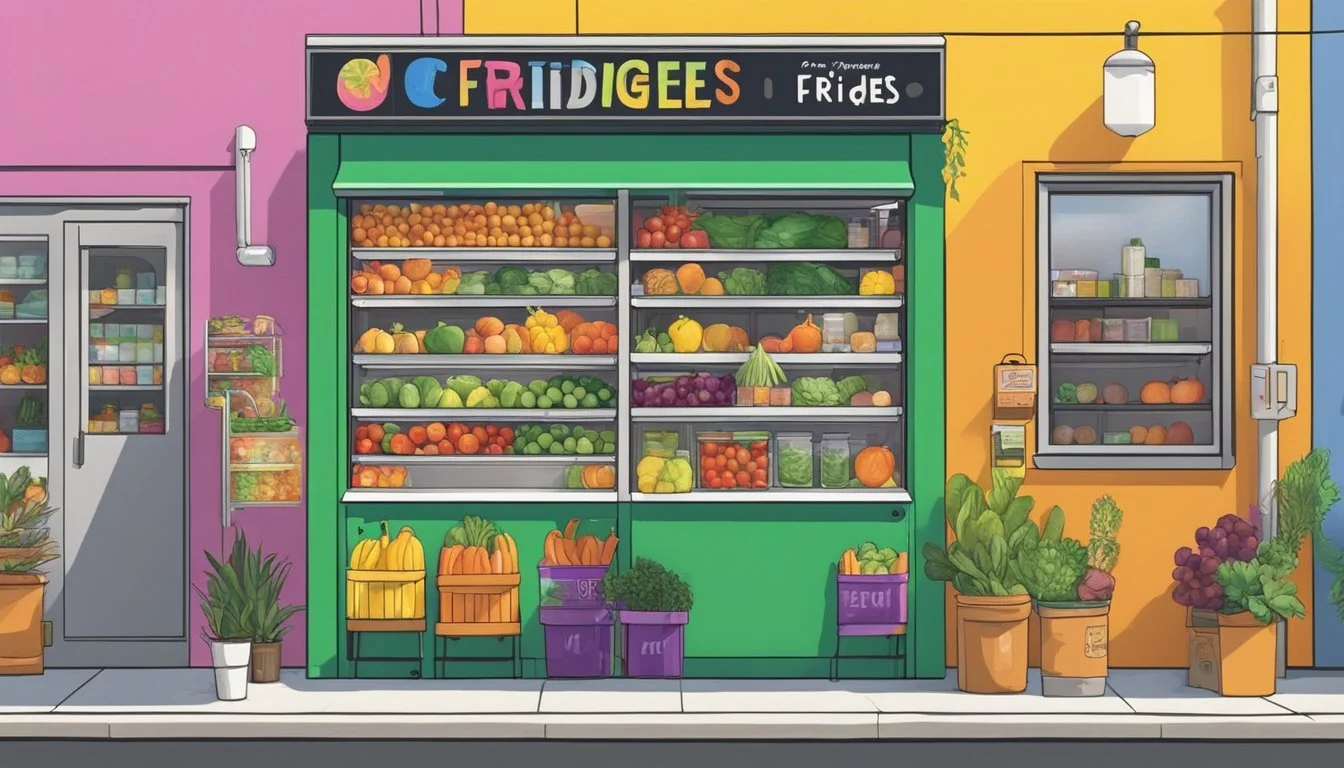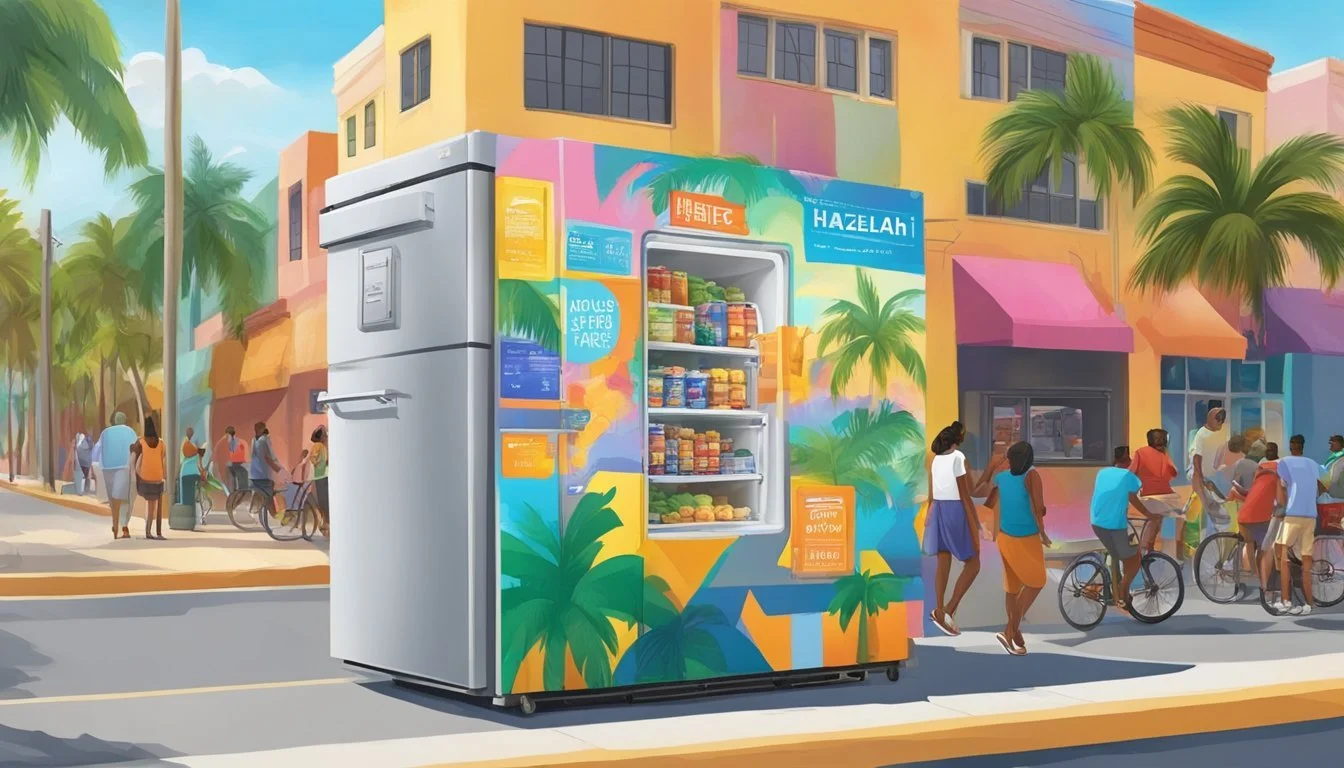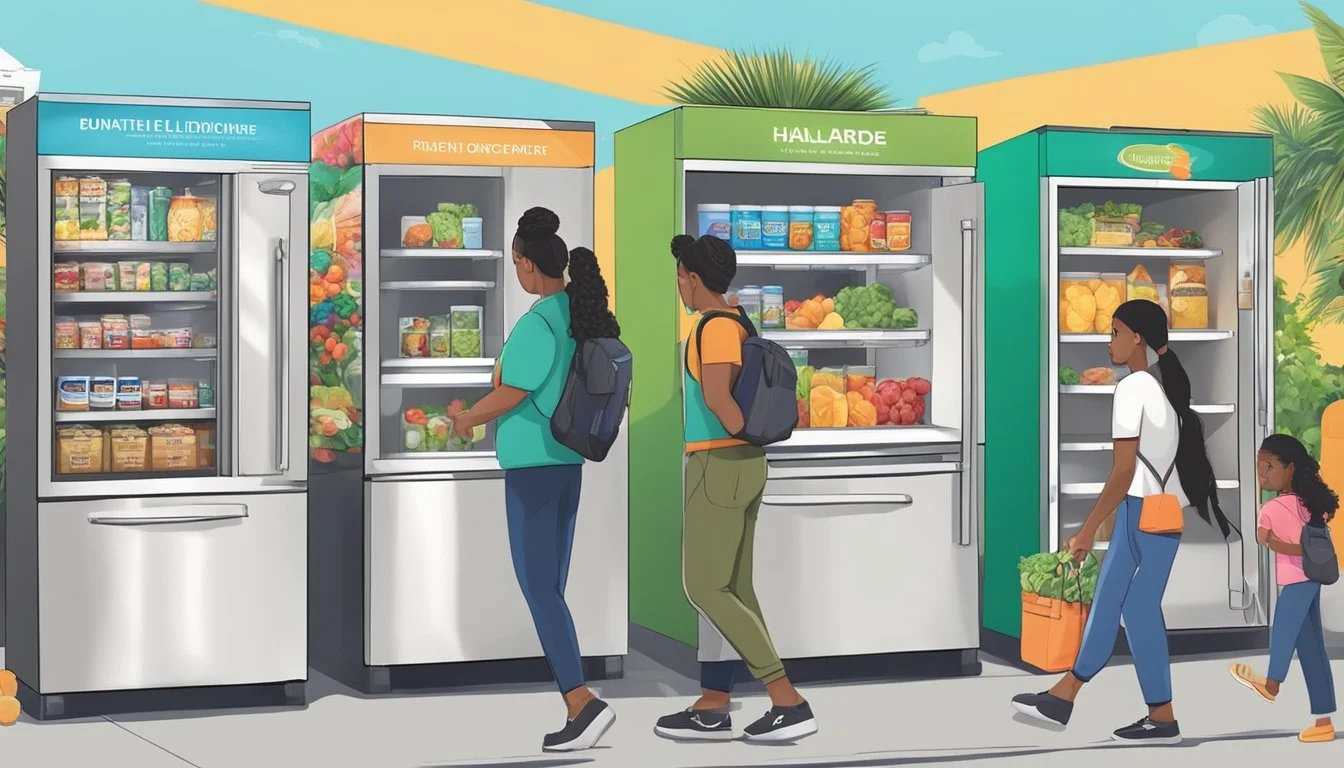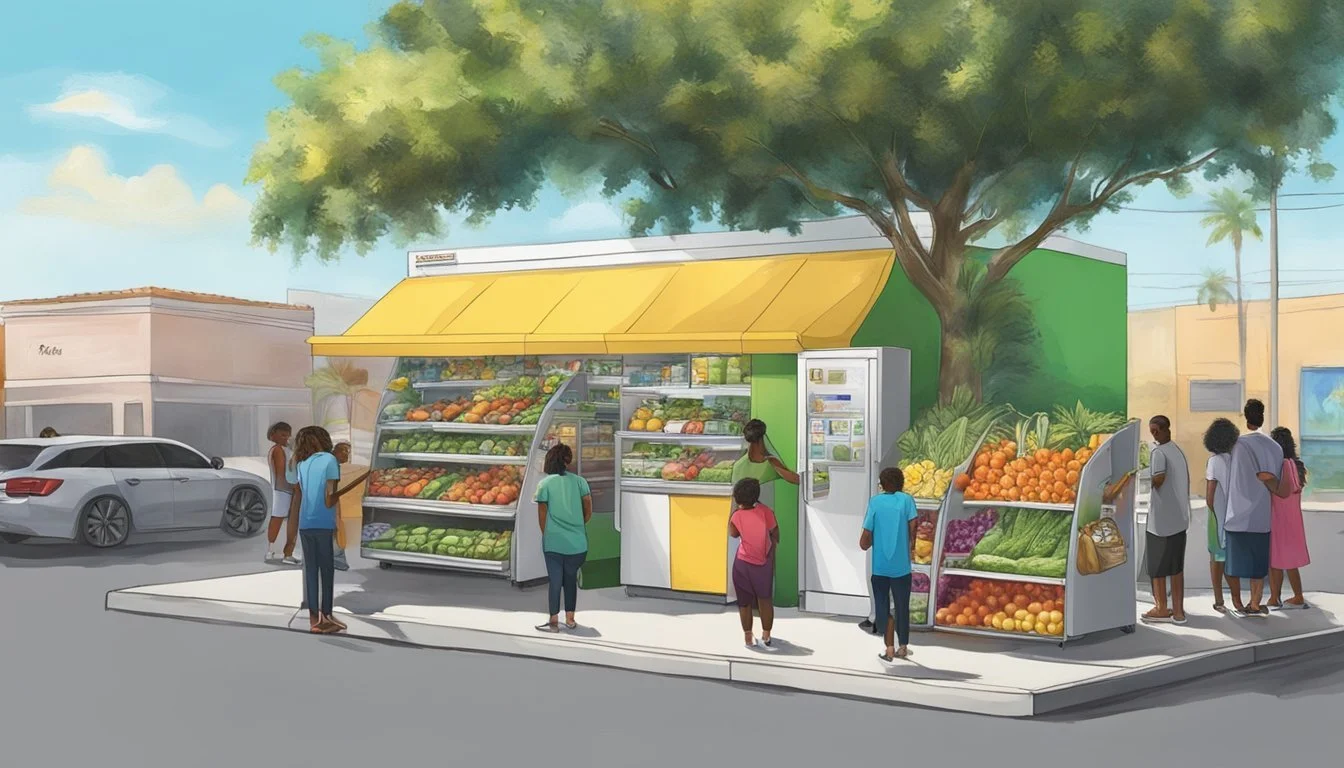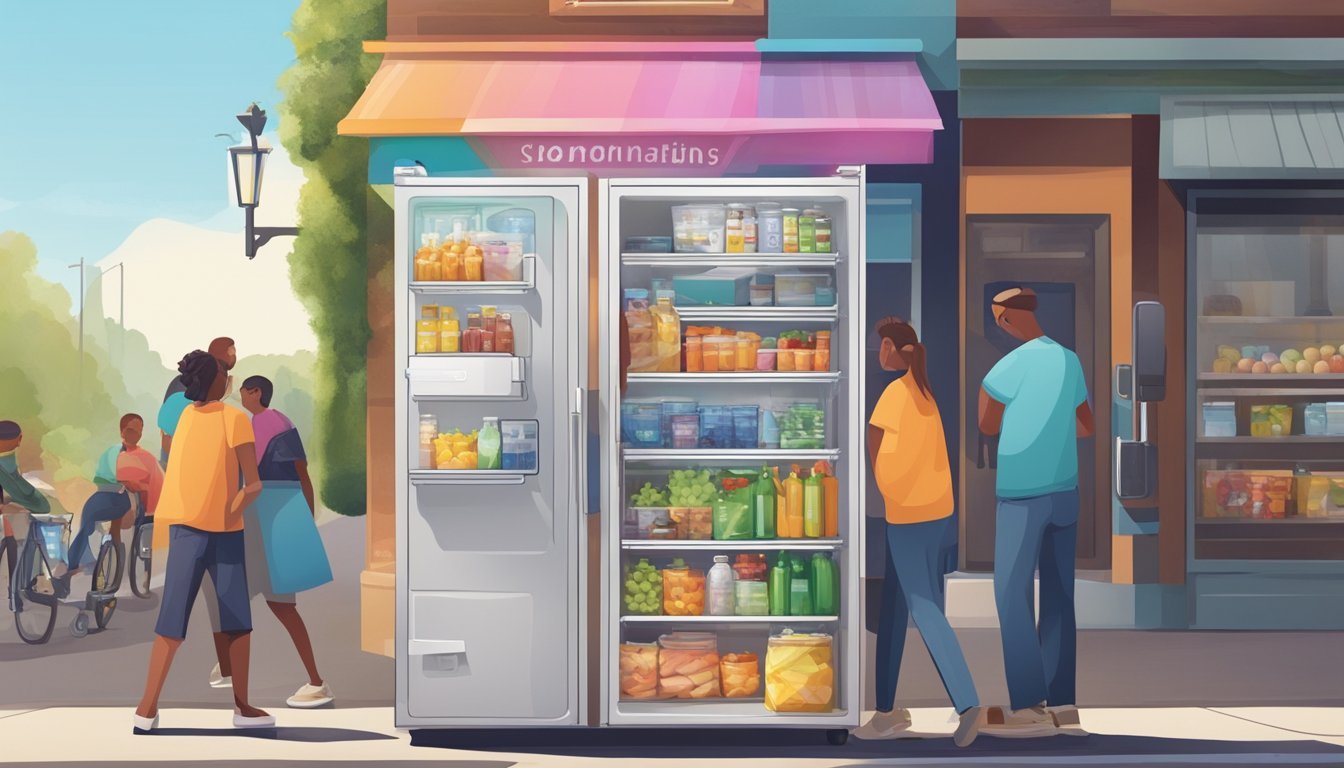Hialeah, FL Community Fridge
Addressing Food Insecurity Locally
In Hialeah, part of the Miami-Dade County area, a novel approach to combating food insecurity has taken root in the form of community fridges. These brightly adorned refrigerators stand as beacons of mutual aid and collective care in neighborhoods, making fresh food accessible at no cost to residents. Unveiled by Buddy System MIA, an activist-led initiative, these fridges are more than just a place to store perishable goods; they represent a movement toward a more food-secure community where the fight against hunger is waged daily through solidarity and resource-sharing.
Strategically located in areas identified as food deserts, the community fridge initiative seeks to mitigate the challenge of accessing nutritious food options. Residents of Hialeah can now find these community fridges filled with food, contributed by fellow residents, local businesses, and nonprofit organizations, fostering a spirit of community support. The initiative in Hialeah is part of a broader effort across Miami-Dade County that has seen multiple fridges set up, each uniting local artists, volunteers, and community leaders in a collaborative push towards ending food scarcity.
Through the use of technology such as WhatsApp groups, the initiative actively encourages neighborhood involvement, creating a network of volunteers dedicated to fridge maintenance and stock replenishment. This sense of shared responsibility is instrumental in sustaining the project, ensuring that the fridges are more than just a temporary fix but a long-term solution for those facing food insecurity.
Background of Community Fridges
Community fridges in areas like Miami, including Hialeah, serve a dual purpose—alleviating food insecurity and reducing food waste. They operate as communal places where individuals have access to free food and can contribute food for others.
Concept and Purpose
Community fridges, also known as friendly fridges, are public refrigerators where food is stored for communal sharing, tackling food insecurity by offering free access to food. The concept is grounded in a mutual-aid framework, aiming to empower and provide for local communities while also addressing the issue of food waste.
A key factor driving the emergence of community fridges is the acknowledgment of surplus food that can feed those in need instead of contributing to waste. These fridges are open for anyone to take from or contribute to, emphasizing no-questions-asked support.
History in Miami
In Miami-Dade County, the Buddy System MIA initiated the adoption of community fridges, strategically placing these resources in areas identified as food deserts. Their presence is particularly significant because many parts of Miami experience disparities in food access, with some neighborhoods lacking enough grocery stores that are within a reasonable distance for residents without reliable transportation.
Miami's initiative is part of a growing movement seen in cities such as New York City, where community fridges first started gaining popularity as grassroots efforts to combat hunger and encourage community self-sufficiency.
Hialeah's Involvement
Hialeah has taken part in this mission by integrating community fridges within its locale. A notable fridge in Hialeah is adorned with a multi-colored geometric-like pattern, emblematic of the city's vibrant community spirit and the cultural embellishment these fridges bring to their neighborhoods.
The collaboration between artists and community organizers in Hialeah not only addresses food insecurity but also transforms a pragmatic solution into a beacon of local artistry and solidarity. By installing these fridges, Hialeah joins other Miami locales, including Coconut Grove and Wynwood, in a united effort to make food more accessible while also fostering community ties.
Current Projects in Hialeah
As part of the ongoing community betterment initiatives, Hialeah has introduced the Community Fridge project aimed at tackling food insecurity. Local artists have contributed to this endeavor, beautifying the fridges and their surroundings, thus merging practicality with artistry.
Known Fridge Locations
Little Havana: Healthy Little Havana (Inside), 515 SW 12th Ave #525
Hialeah: Exact locations within Hialeah are pending confirmation, but residents can join the Community Fridge Care Team WhatsApp group to stay informed about new fridge installations and to connect with community leaders.
Contributing Local Artists
Several local artists have contributed to the Community Fridge project through their captivating artwork:
Kristin Guerin: Recognized for her vibrant and interactive art installations
Vic Garcia: Known for his distinctive style that often features elements of nature and surrealism
Ahol Sniffs Glue: A street artist whose work frequently comments on social and economic issues
Alex Yanes: Celebrated for his whimsical and colorful contributions to Miami's art scene
Atomik: Renowned for his iconic orange character that has become a staple of Miami's visual identity
Haiiileen: Has partnered with the Buddy System MIA and is known for her immersive and experimental art pieces
Residents and visitors can find these artists' work adorning the community fridges and may follow updates on new art pieces through the artists' Instagram profiles.
Operations and Logistics
The Hialeah Community Fridge initiative thrives on seamless operations and logistics, ensuring that the system of food distribution, appliance maintenance, and community involvement operates effortlessly. Critical to this effort are dedicated volunteers, managed donations, and meticulous attention to food safety.
Volunteer Coordination
Volunteers form the backbone of the Community Fridge initiative. They ensure diverse tasks such as stocking the fridge with donations, maintaining cleanliness, and performing appliance repairs are routinely addressed. A dedicated team manages these volunteers through various communication platforms, including a WhatsApp group, creating an efficient Buddy System that promotes active engagement and responsiveness among volunteer teams.
Donation Management
The initiative's lifeblood is the donations that stock the fridge. Management entails a systematic process to track, sort, and utilize food contributions effectively. Donations follow a set of guidelines to align with the needs and consumption patterns of the community. They prioritize:
Perishable Items: Fresh fruits and vegetables.
Non-Perishable Items: Canned goods and dry staples.
Weekly audits by volunteers help maintain an inventory that prevents waste and aligns with the community’s demand.
Food Safety and Maintenance
As an essential aspect of operations, food safety and fridge maintenance protocols are strictly implemented. Volunteers are well-trained in these protocols, which include:
Regular Inspection: Checking expiry dates and the quality of food items.
Appliance Care: Frequent servicing and filter replacements to ensure the fridge functions reliably.
The consistent application of these measures by volunteers guarantees that food distribution not only meets demand but does so in a manner that is safe and sustainable for the Hialeah community.
Impact on the Community
Community fridges in Hialeah serve as a vital resource for individuals and families facing food insecurity. They provide not only free food but also uphold a sense of solidarity among residents, creating a tangible positive effect on the local community's well-being.
Addressing Food Insecurity
The presence of community fridges in Hialeah, like those maintained by initiatives such as Buddy System MIA, directly combats food insecurity. They provide free access to food including fresh produce, eggs, pre-made meals, and meat. This access reduces the uncertainty of where the next meal will come from for many individuals. In doing so, these community fridges have distributed over 28,000 meals to local communities, illustrating their significant role in tackling hunger.
Supporting Local Agriculture
Community fridges offer a channel for supporting local agriculture, allowing for a steady market for locally grown fruits and vegetables. By stocking these fridges with food sourced from local farm shares and markets, the initiative fosters a stable demand that can benefit local farmers, offering them a fair price for their produce and reinforcing community bonds.
Reducing Food Waste
Beyond addressing the immediate need for food, community fridges in Hialeah also participate in reducing food waste. They provide an outlet for food that might otherwise be discarded due to overstock or approaching sell-by dates. This proactive approach not only tackles waste but also ensures that quality, fresh food reaches those who need it most instead of ending up in landfills.
Challenges and Solutions
Community fridges in areas like Hialeah, FL, serve as critical resources for alleviating food insecurity, especially in the wake of the COVID-19 pandemic. While organizations such as Buddy System MIA play a pivotal role in these initiatives, they encounter several challenges that require innovative solutions to ensure their continual operation and effectiveness.
Navigating Legal Aspects
Community fridges operate in a complex legal environment within Miami-Dade County, where public placement and food safety regulations are of concern. Buddy System MIA must work closely with local authorities to ensure compliance with laws to avoid penalties that could hinder operations. Establishing clear guidelines and seeking formal approvals for fridge locations help mitigate legal issues.
Maintaining Supply and Demand
Consistency in stocking the fridges is crucial to meet the needs of neighborhoods facing food scarcity, such as Little Haiti, Overtown, and Coconut Grove. Ensuring a reliable supply chain of perishable and non-perishable foods requires strong partnerships with donors and efficient logistics. Here is a strategy to maintain balance:
Initiate food drives regularly to keep up with the demand.
Engage local businesses to contribute surplus food items.
Community Engagement and Awareness
To tackle food deserts like Richmond Heights, community involvement and awareness are vital. Buddy System MIA and other nonprofits must:
Educate residents on the benefits and proper use of community fridges.
Utilize social media campaigns and physical promotions to raise awareness.
Foster a volunteer network to maintain and monitor the fridges, ensuring they are clean and well-stocked.
Future Prospects
The Hialeah Community Fridge initiative looks to broaden its impact on food security and nutrition within Miami-Dade County. Strategic expansion and partnerships are on the horizon, aiming to further serve Florida cities with increased access to fresh food.
Expansion Plans within Miami-Dade County
Plans to expand the reach of community fridges include mapping potential new locations throughout Miami-Dade County. The focus will be on food deserts and areas with a high demand for food pantry services. Hialeah aims to be a model for other cities in Florida, illustrating the positive impact that these fridges can have on community nutrition. The expansion strategy involves:
Identifying new sites: Prioritizing accessibility and visibility.
Securing resources: Obtaining fridges and fresh food supply.
Engaging locals: Involving community members in the upkeep.
Collaborations and Partnerships
The drive to increase the number of community fridges involves collaboration with local businesses, non-profits, and government entities. By partnering, the Community Fridge initiative in Hialeah can ensure sustainable operations and a consistent supply of nutritious food. These alliances are critical, given the overlap of goals among organizations focused on mitigating food insecurity. A snapshot of collaborative efforts includes:
Local Restaurants and Farms: Donating surplus produce and meals.
Volunteer Groups: Assisting in maintenance and stock replenishment.
Health Institutions: Providing guidance on nutrition and healthy eating.
Through these concerted efforts, the Community Fridge movement aspires to become an enduring fixture in Miami-Dade County, making strides against hunger and contributing to the health and well-being of its residents.
How to Get Involved
Contributing to the Hialeah, FL Community Fridge is an exceptional way to support food access and help the local community. Opportunities abound for individuals looking to volunteer, donate, or simply raise awareness about this cause.
Volunteering Opportunities
Individuals can partake in various volunteer roles to ensure the fridge is operating smoothly. Volunteers are crucial for:
Monitoring the fridge: Ensuring it stays clean and stocked.
Coordinating efforts: Organizing food drives and managing donations.
To volunteer, contact the Buddy System MIA initiative for details on specific shifts like their operational hours in Hialeah, which include Monday through Friday, 8:00AM-5:00PM.
Food and Appliance Donations
Donations are critical for the fridge to thrive. The community fridge accepts:
Perishable and non-perishable food items.
Appliances such as fridges in good working condition.
When considering donations, freshness is key, particularly for perishable items such as oranges or other produce. For donation inquiries, consult the Freedge map or contact local organizers through Instagram.
Spreading the Word
Raising awareness is equally important. Sharing information can be done via:
Social Media: Post and share on platforms like Instagram to engage with a broader audience.
Community Networks: Employ local bulletin boards or community events in Hialeah and the greater Washington area to distribute flyers or speak about the community fridge initiative.
By disseminating information, more people can get involved, leading to greater community support and a wider network of donations and volunteers.


